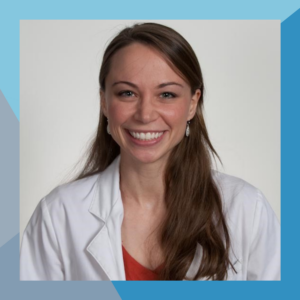Kelly Johnson, MD, MPH, Takes on Leadership Role as CAPTC’s Medical Director
We are excited to introduce Kelly Johnson, MD, MPH, the new clinical director of the CAPTC, who accepted the position after the tenure of Ina Park, MD, CAPTC’s principal investigator (PI). The clinical program of the CAPTC supports healthcare providers through virtual and in person trainings, technical assistance, and STI consultation. We sat down with Dr. Johnson to talk about her public health journey, interest in sexual health, and goals for the clinical program.
Dr. Kelly Johnson’s journey began in her home state of Virginia as a volunteer for the Virginia Health Department, where she created presentations on sexual health to share with young people who were sexually active. After attending college, she worked for the federal government for a few years in health policy and emergency care before deciding to attend a combined MD/MPH program where she discovered her love for microbiology and researching infectious diseases. She came to UCSF for her fellowships and residency following medical school. As she conducted research into sexual health, her interest in the field grew, eventually inspiring her to pursue fellowships in infectious diseases and STIs.
In addition to her position as the clinical director of CAPTC, she is an inpatient Infectious Diseases consultant at UCSF and a medical officer for the California Department of Public Health STD Contol Branch. She is a subject matter expert for the warmline operated by the National Network of STD Clinical Prevention Training Centers, where she provides clinical consultation on complex cases in STI patient care. Her current focus is on the management of congenital syphilis among other topics.
Why are you interested in sexual health?
It gets back to what it was about microbiology and infectious diseases that I liked so much. You have an individual patient, they have a particular infection, and so you help them get them treated. But it’s also a population issue because these are transmissible infections. You’re dealing with these networks of people and asking questions such as “How do you communicate with people? How do you get people in care in a way that is non-stigmatizing and encourages them to come back? How do you talk to patients in a way that’s not judgmental? How do you get them to talk to their partners?” It ties in a lot of my interests, like individual care, population health, language, and communications. Sexual health really felt like the right place for me in the end, and there’s a lot of research and great people in this field.
What are your goals for the clinical program?
Overall, we want to continue to provide high quality provider education and training in the sexual healthcare field. We’re hoping to incorporate a mix of the basics of sexual health, common diagnoses, and treatments — things we always cover — and we’re hoping to start to bring back in-person events and more of a focus on emerging data and science.
I’ll give you an example. We have recent data on the success of doxycycline as an antibiotic that patients could take after they have sex as a post-exposure prophylaxis to prevent them from getting things like syphilis, chlamydia, or gonorrhea. This is new, potentially practice-changing science, and we are getting so many questions and requests for training on this. Having to create new content, really going into the science, and being able to speak to it — I’m proud of us for being able to do that, and I would like us to continue to be the team that people come to for supporting people on the ground dealing both with the basics of sexual health care and helping providers be aware of what’s new.
What is something you would change about the way that clinicians are trained in sexual health?
I wish there were more opportunities to include sexual health in the medical education system. Reflecting on my own medical training, I went to a program that was very community-oriented and very clinical, but it’s not like we had a dedicated sexual health curriculum or rotation. It’s just a function of med schools: a relatively short time, a lot to cover material-wise, and sometimes sexual health is not one of the top priorities.
Talking openly about sexual health and sexual practices is not easy for providers and patients in all scenarios, so I think the more training that providers can have around having those conversations in a way that’s non-judgmental, non-stigmatizing, and culturally competent is so important, and I would love to see that incorporated more in early medical education.
Reflecting on your career, what is something you’re proud of?
I am proud of the clinical work that I’ve done because I feel that that takes my maximal effort. When I’m doing my clinical work, I am really dedicated and detail-oriented. I try to put my all into caring for patients: being as thorough as possible in taking their histories, examining them, looking up the data, and coming up with the treatment plan. I am fortunate to have the privilege to take care of people.
My career has played out in a way that I didn’t anticipate. I am proud of how things have been able to work out. Some of it’s hard work, and a lot of it’s just being in the right place at the right time, but I’m happy that I’ve been given these opportunities. I feel like the clinical team is in a good position, and we have a lot of work going on. We have a lot of growing that we still get to do, so I’m proud of what we’ve done, and I’m excited for where we’re headed next.


